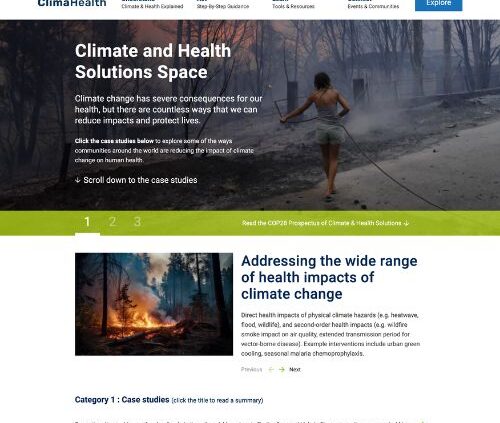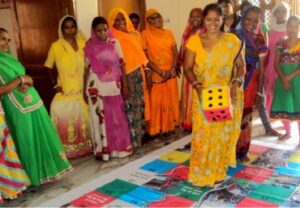
Explore more case studies
Mahila Housing Trust (MHT), 2023
Implementing partners: Local government agencies
Published In: COP28 Prospectus of Climate-Health Solutions, 2023
India is highly vulnerable to climate change. Nearly 75% of its districts are categorized as hotspots for extreme climate events.
Impacts of heat stress are higher among India’s slum dwellers due to the vulnerable infrastructures made of heat-trapping materials. In addition to creating thermal discomfort indoors, the tightly packed houses get polluted with dust, ash, smoke, and chemicals. Home-based workers face a greater impact of indoor pollutants due to more time spent indoors. They are prone to diseases like pneumonia, stroke, and lung cancer, with women particularly at risk as they are most likely to work or spend time indoors.
The mission of Mahila Housing Trust (MHT) is to build a sustainable and scalable model of women-led climate change action to push climate solutions cutting across all levels of planning governance and offering affordable products to communities. It collaborates extensively with government bodies (e.g., India’s National Disaster Management Authority), local communities, and other organizations. Its work has been globally recognized through various awards, e.g., the UN Global Climate Action Award, the UN Sasakawa Award, and the Ashden Award.
The community leadership development model of MHT is based on a three-step process. First, MHT organizes all families in a community into a membership group called a Community-Based Organization (CBO). MHT also manages sensitisation campaigns and hosts area meetings with CBO members to identify the needs and aspirations of the community. CBO members are then encouraged to recognize women leaders among themselves as members of the Community Action Group (CAG). The CAG and its women leaders act as the executive committee of the CBO members and lead action on their behalf. The CAG members are then finally trained to interface with government bodies actively.

Women in urban slums learning about Climate change by Playing Snakes and Ladders
Lack of knowledge about the causes and impacts of climate change is the first barrier to building climate resilience in slum communities. MHT has developed a methodology using simplified communication methods (e.g., games, demonstrations, videos) to introduce the concept of climate change and build climate resilience. For example, through a Snakes and Ladders game played during training sessions and community-level meetings in slum settlements, women understand the evidence behind unbearable summers and monsoons. This also helps women develop a future-oriented mindset and plan investments to secure themselves and their communities from climate change impacts.
MHT partners with local leaders to influence building policies, such as the cool roof program. It targets vulnerable settlements with poor-quality homes that trap heat and become dangerously hot. Cool roofs help keep the indoor temperatures lower by 2°C to 5°C and offer a cost-effective solution, helping prevent heat-related deaths and illnesses. Innovative credit mechanisms like climate loans have been devised to use climate-resilient technologies like cool roof solutions.
In collaboration with local authorities, MHT helps develop heat action plans (HAPs), enabling cities to better organize local heat actions that protect public health. The HAPs prioritize an enhanced focus on the needs of vulnerable groups identified through the vulnerability assessment by MHT. Jodhpur, an Indian city in Rajasthan, launched its first-ever HAP in 2023 to strengthen local preparedness and resilience to intensifying severe heat hazards. The Jodhpur plan was developed based on local data and community input and enables the city to better organize local heat actions that protect public health.
In the last 27 years, MHT has worked in more than 30 cities across South Asia, partnering with communities and local governments to deliver tangible improvements in housing and infrastructure and building climate resilience in lower-income urban settlements. Over 15,000 women climate champions have positively impacted their communities’ health and homes while starting to advocate for locally led adaptation across eight cities in India.
MHT aims to scale its three-phase model to 16 new cities across India, Nepal, and Bangladesh and further deepen its engagement in 11 existing cities. It plans to impact 30 million individuals over the next five years.